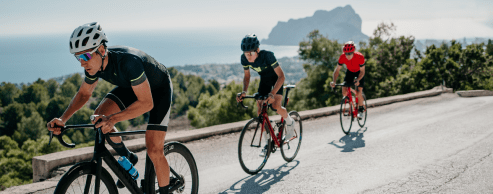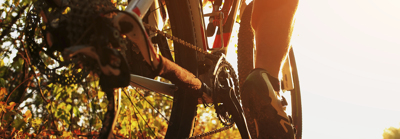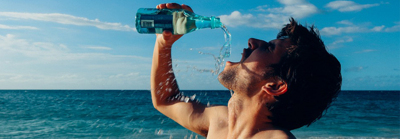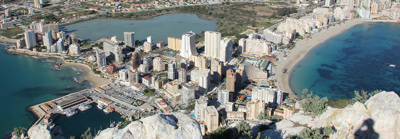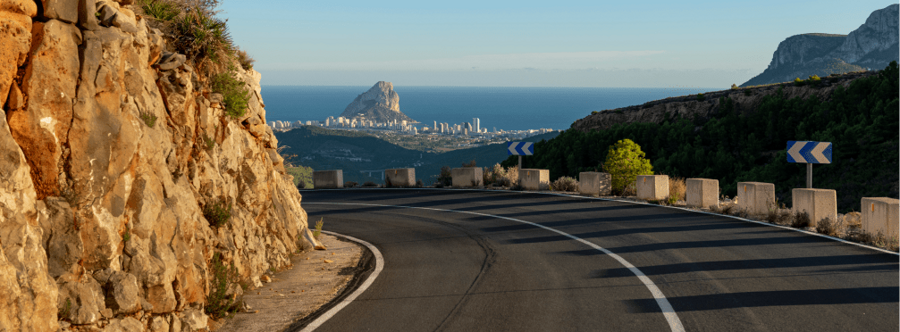
Cycling in Spain is an unforgettable experience with its diverse landscapes, picturesque towns and challenging mountain roads offering something for cyclists of all levels. Whether you're a seasoned professional looking to tackle famous climbs or a leisurely rider enjoying the flats of the Mediterranean coast, Spain has it all. However, like any destination, there are certain dos and don'ts to ensure your cycling adventure is safe, enjoyable and memorable. In this post, we'll guide you through the essential tips for cycling in Spain, helping you make the most of your time on the road while avoiding common pitfalls.
The dos and don’ts of cycling in Spain
Do plan when to go cycling in Spain
Spain can become blisteringly hot, especially during the summer months (June to September), when temperatures can soar, particularly in Andalusia and the southern regions. During this time, the best option for cycling in Spain is to head to the Pyrenees and the cooler northern regions.
From September onwards, the weather starts to cool and the Costa Blanca becomes a top destination for cyclists. Towns like Calpe and Finestrat are particularly popular, with their ideal temperatures in autumn, winter and spring, making them prime locations for cycling holidays in Spain. In northern and central parts of Spain, colder temperatures can be expected from November until February.
Generally speaking, the best time for cycling in Spain is from March to May, when the weather is comfortably warm across the country, providing cyclists with the most pleasant conditions.
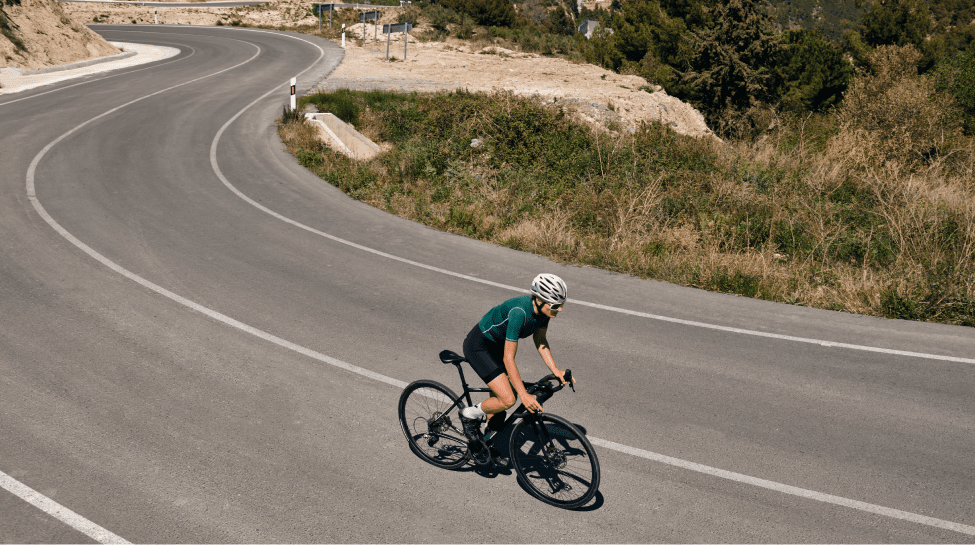
Don’t be oblivious to cycling safety
Cycling in Spain is generally safe, with well-marked routes and dedicated bike lanes on many of the popular cycling routes, especially in regions like the Costa Blanca. However, it's essential to remain vigilant and prioritise cycling safety at all times. Always follow the rules of the road, as Spanish drivers are accustomed to cyclists but expect them to adhere to traffic regulations.
Wearing a helmet is not just recommended: it’s a must for protecting yourself. Additionally, it's wise to carry some form of identification, including your medical insurance details, the address of the hotel where you're staying and important emergency contact numbers. This precaution ensures you're prepared in case of an accident and can help speed up medical assistance if needed. By staying safe and prepared, you’ll be able to fully enjoy cycling in Spain without any worries.
Do pack light
When cycling in Spain, it's important to pack only the essentials, but don't skimp on comfort and performance. Alongside your must-have items like bike shorts, helmet, gloves and sunglasses, here are a few additional items to consider:
- A high-quality sunscreen with a strong SPF to protect your skin from the intense Spanish sun.
- A lightweight waterproof jacket, just in case of unexpected rain showers.
- A snug-fitting jersey or synthetic top that minimises wind resistance and keeps you comfortable, especially during the cooler mornings and evenings.
- Two or more water bottles to stay hydrated throughout your ride, as temperatures can rise quickly.
By packing smart, you'll ensure you're ready for anything Spain's cycling routes throw your way.
Looking for a cyclist’s paradise?
Discover moreDo choose the right bike for your destination
Cycling in Spain offers a diverse range of experiences, from winding dirt paths and rugged mountain passes to smooth urban roads with wide bike lanes or cobbled streets in charming towns. The terrain you’ll encounter will determine the type of bike you need.
If you’re planning on a leisurely ride through both cities and countryside, a versatile touring bike with medium-width tyres (around 28 to 36 cm) is a great choice. For more adventurous routes, including off-road trails, a mountain bike with wider tyres (36 to 40 cm) will provide the stability and traction you need.
Additionally, make sure your bike is properly fitted to avoid discomfort. A poorly fitted bike can lead to back pain and muscle strain. Most bike rental shops or cycle stores will assist with proper fitting, but as a general guideline, place your heel on the pedal with your knees fully extended, then adjust the seat height to ensure a comfortable riding position.
Don’t leave home without…
A puncture repair kit, a small pump and a spare tube are absolute essentials when cycling in Spain. Punctures can happen unexpectedly, especially on longer rides, so it's important to be prepared. To make the process smoother, cover the spare tube in baby powder; this helps it slide into the tyre with ease and prevents unnecessary friction.
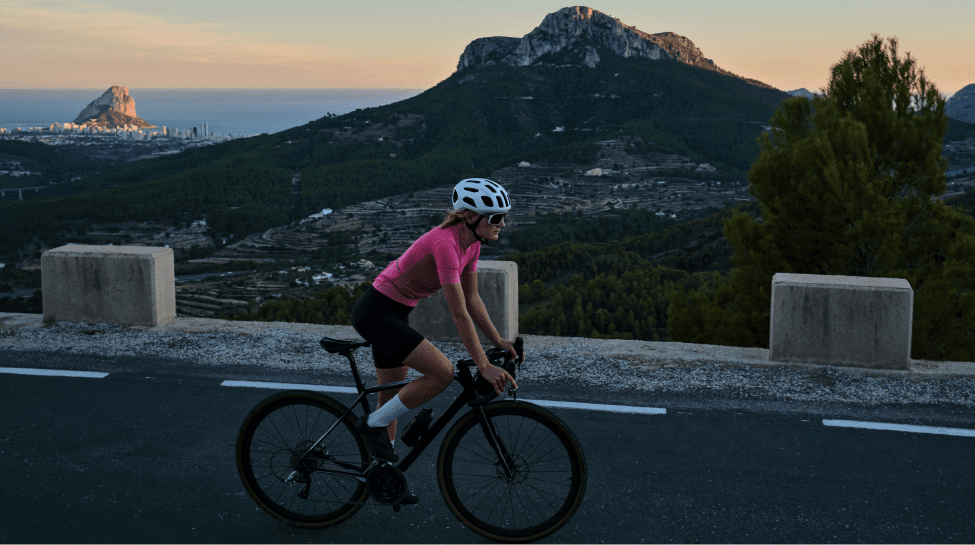
The best Mediterranean cycling routes
Calpe and Finestrat in the Costa Blanca are two of the most sought-after destinations for cycling enthusiasts, offering a perfect mix of challenging climbs, scenic routes and mild Mediterranean weather. Known for their professional cycling roads, these towns have become a hub for cyclists looking to test their endurance on routes that have hosted top-tier races. The iconic cycling in Calpe features breathtaking coastal views and the challenging ascent to the famous Coll de Rates, a must-ride for any serious cyclist. With a variety of routes suitable for all levels, from casual riders to competitive athletes, Calpe offers something for everyone.
Just a short ride away, Finestrat boasts equally stunning landscapes and is home to the legendary Puig Campana, one of the most demanding climbs in cycling Valencia, Spain. The region is famous for its smooth, well-maintained roads, making it ideal for training or leisure rides. With its combination of coastal charm, mountainous terrain and year-round cycling-friendly climate, Calpe and Finestrat stand out as prime destinations for those passionate about cycling in Spain.
Hotels designed for cycling in Spain
AR Hotels offer the perfect base for cyclists, with strategic locations near some of the best cycling routes in the Costa Blanca. With over 20 years of experience hosting professional teams, we know exactly what cyclists need. Each hotel is equipped with bike storage facilities, ensuring your gear stays secure, while our adapted menus and flexible dining hours keep you fuelled for those long rides. Whether you're looking for a luxurious stay or a more relaxed atmosphere, AR Hotels have something to suit every cyclist’s needs.
For an added touch of relaxation after a day of riding, AR Hotels feature gyms, spas and massage services to help you unwind and recover. AR Diamante Beach is ideal for those seeking luxury, while Nature Suites and The Cookbook are excellent choices in the low season, offering top-notch facilities in quieter months. Contact us to find out more about these cyclist-friendly hotels and how they can enhance your cycling experience in Spain.
